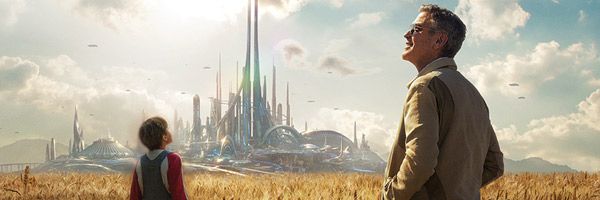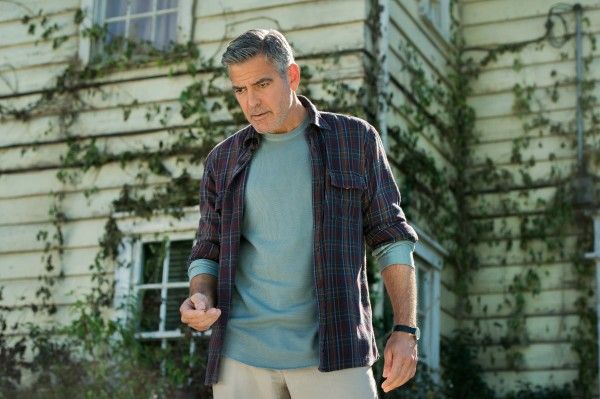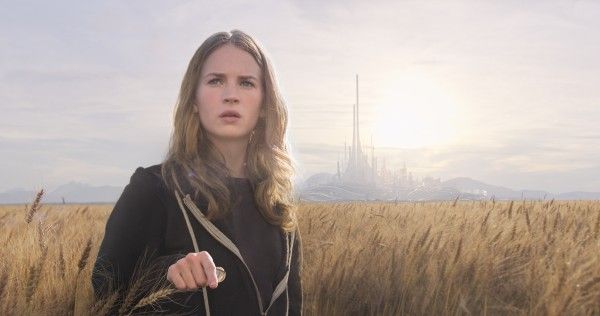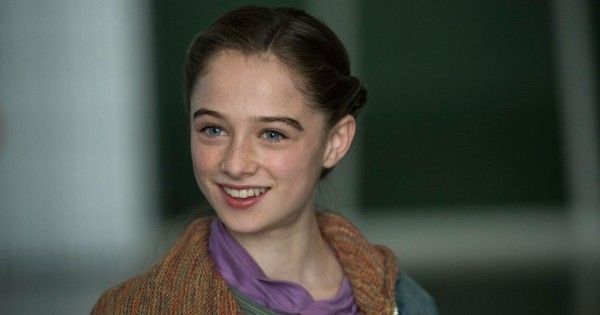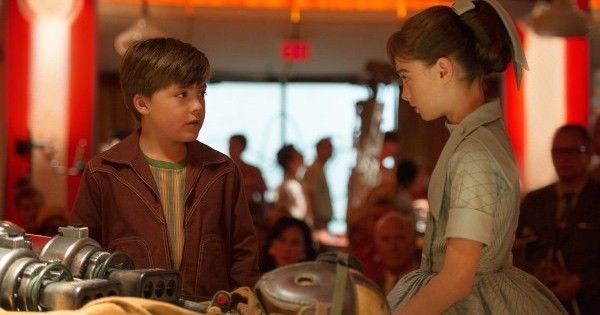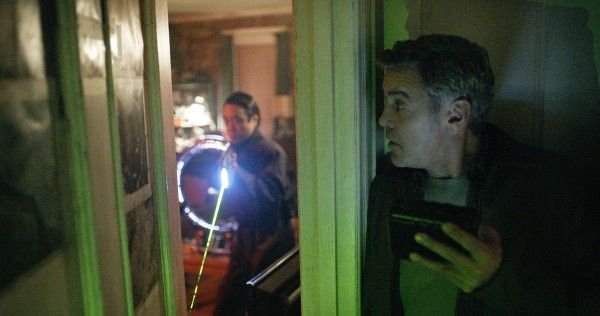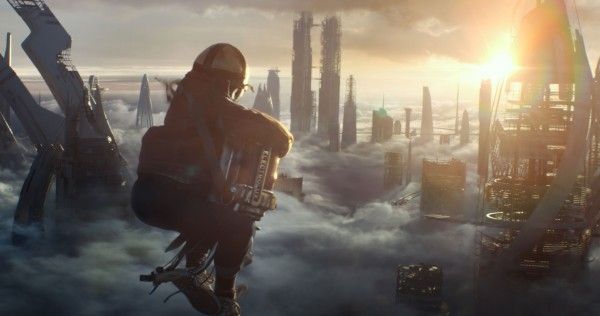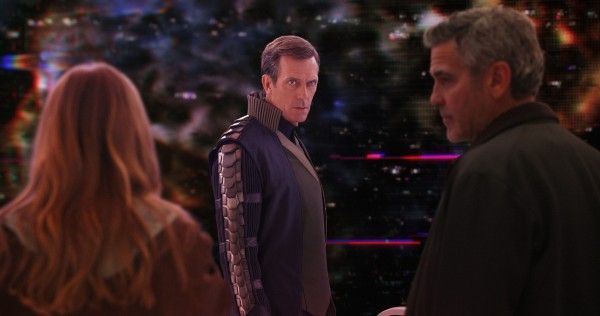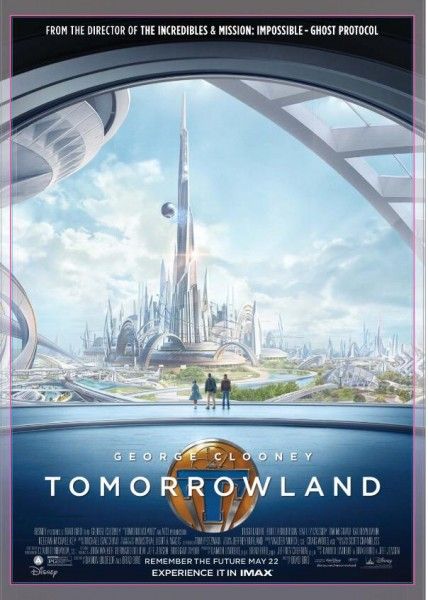Things are not looking good for Tomorrowland. With critics currently divided at a 50/50 dead heat on Rotten Tomatoes and opening weekend box office numbers disappointingly low, it looks like Tomorrowland is set to be labeled as a failure in the absence of serious legs or a major international turnout. And that's a damn shame. This is not the fate Brad Bird's ode to optimism deserves.
Let’s be very clear about something from the get-go. Tomorrowland is a flawed film, but since when does being flawed mean something isn’t beautiful?
Tomorrowland opens with grizzled grumpypants Frank Walker (George Clooney) recalling splendid visions of the future from his childhood, “When I was a kid, the future was different,” he tells us as the scene transitions to the 1964 World Fair where we see his younger self (Thomas Robinson) enthusiastically lugging his handcrafted jetpack for consideration. While the haughty judge (Hugh Laurie) is unimpressed, a strikingly self-possessed young British girl, Athena (Raffey Cassidy) slips Frank small gold pin emblazoned with a “T”, and ushers him into the fantastical world of Tomorrowland - an act he eventually claims ruined his life.
Back in the present we meet Casey Newton (Britt Robertson), an unfailing optimist and scientifically inclined teenager who lives at home with her NASA engineer father (Tim McGraw) and her endearing younger brother (Pierce Gagnon). Casey is a dreamer with a life-long desire to travel to outer space, who spends her nights sabotaging the the cranes intended to tear down the Cape Canaveral launch platform. When Athena turns up again in the present, mysteriously unaffected by the passage of time, she’s taken with Casey’s ingenuity and spirit, and slips her the same pin that sent Frank Walker to Tomorrowland fifty years ago.
From here the film takes off in all kinds of wonderfully entertaining, if occasionally muddled, directions. It’s honestly baffling to me that Tomorrowland has taken such a critical beating. It’s a lovely film with a lovely message. I must confess, like our plucky heroine, I too am an optimist, and in that spirit I’ve laid out what makes Tomorrowland great and why we need more films like it.
It's All About Positivity
Tomorrowland is subversion via optimism. The film posits that the world has become inured to our eventual apocalypse through the onslaught of dystopian and apocalyptic fiction combined with the ever-negative, fear-mongering media. We’ve become content in the certainty of our doom and resigned ourselves to a dreary tomorrow because it doesn’t require us to do anything today. Bird’s Tomorrowland challenges us to be better; To rise above the overwhelming odds, accept that the future is in our hands, "man up", so to speak, and do something about it. It’s a call to arms, and it’s about damn time. Because he’s not wrong. With bi-weekly spats of moral outrage and armchair activism we’ve become a passive, ineffectual society that’s constantly spinning in circles.
In one specific example, Simon Pegg recently delineated the problems with geek culture and how our obsessions are infantilizing us. We dismantle casting rumors and set photos rather than focusing our attention on real world issues that matter. But this is a problem that is in no way restricted to the geek sphere. Whatever your poison, whether it's cable news or celebrity gossip, more and more we're using the media to focus on issues that just don’t matter. With smart phones, we have palm-sized mini miracles in our hands and what do we use them for? We’re given to distraction rather than making an effort to cultivate a better world. Invention has pointed inward and become self-serving. When it comes to fixing global problems, I don’t think there’s an app for that. In the words of our leading lady, “I get things are bad, but what are we doing to fix it?”
Dynamic Female Protagonists
Yeah, you read that right, protagonists. Plural. Tomorrowland gives us not one, but two, wonderfully complex and filled out female characters. Casey is a damn fine female role model, one of the best in recent tentpole memory. And she’s not just a mouthpiece of positive change, all talk and no action. When we meet Casey, she’s zipping around on a motorcycle committing acts sabotage against government property in the pursuit of what she believes is right. I’m not saying being criminal is an admirable quality, but Casey Newton puts her money where her mouth is. Casey has guts; she’s driven, clever, inquisitive and most notably possess no stereotypically “girly qualities” (except an inexplicably ever-flawless blowout) . She also has no love interest throughout the film. It’s all very progressive, especially when you consider this is all coming from Disney, progenitor of the princess industrial complex.
That’s before we even take Athena into account. Athena is the film’s secret weapon, undersold in marketing campaigns. She’s the undeniable scene-stealer and every moment she’s in is better for it. Like Casey, Athena is not defined by her femininity or girlishness. She’s an ass-kicking force to be reckoned with, driven by her own motives, and answers to no one. While "Strong Female Character" has become an overwrought buzzword as of late, Tomorrowland offer two of just that, each strong in their own way, and neither just because they can throw down in a fight.
Complex, Compelling and Unusual Character Relationships
Best of all, Tomorrowland lets these two fabulous female character interact and develop a relationship together before Frank even enters the mix. The film passes the Bechdel test in spades, as the two talk and bicker about a number of subjects, not one of which is a romantic interest. In general, the marketing campaign for Tomorrowland was a huge miss, too focused on preserving mystery (more on that later), but one of the biggest errors was failing to play up the dynamic between these two exciting female characters.
The relationship between Athena and Frank is even more fascinating, and unlike anything I’ve seen before. Unknown to Athena, Frank fell in love with her as a boy, and now as a bitter middle-aged man, the hurt and resentment over his broken heart comes flooding back and the two share a peculiar bond that could easily veer into creepy territory given the massive age difference. But Clooney’s trademark megawatt charm is dialed down to an all-time low and Athena is in truth just as old, and fare less human than Frank, making him seem like the juvenile. The matter is handled gracefully without ever being icky. I’ve seen a lot of criticism that this relationship was a bad move, and I couldn’t disagree more. It’s a brave and complex kinship, innocent as it needs to be, but you feel the depth of it. It's oddly touching and a resolved to a T.
Brad Bird's Signature Set Pieces
Tomorrowland, the place, is a beautiful construction, a gleaming ivory cityscape backed by blue skies. Young Frank soars through those skies on his newly fixed jet pack in an invigorating, gleeful sequence that could only be imagined by someone who loves retro-futurism as much as Bird. When Casey is first transported there via the T pin, she runs through the landscape in an extended tracking shot, reveling in every detail of the splendid city. Jet packs, rockets, hover monorails, and airborne automobiles fill the sky. Synchronized swimming goes airborne in floating, gravity-defying pools. Tomorrowland is a Utopian metropolis brought to life, filled with mechanized wonders. The only shame is that the film spends so little time there.
All the same, there are a number of other exciting set pieces that carry Bird’s signature kinetic, assembly-line sense of action. In a thrilling sequence, Frank’s booby-trapped home is invaded by deadly robots and a delightful action-packed escape sequence ensues as we see Frank’s genius evidenced in the clever contraptions that protect his home. In perhaps the most “Brad Bird” of all the set pieces, the Eiffel Tower splits in two, revealing an enormous retro-futuristic rocket that thrills with a childlike sense of invention and possibility.
It Has the Potential to Inspire
After leaving the theater, a friend and I were discussing the flaws and merits of the film, and when one of us would occasionally get negative or cynical the other would joke, “That’s not very Tomorrowland of you,” or, “You’ll never get into Tomorrowland with that kind of mentality!” I love that the film has the ability to inspire a mode of thought. Tomorrowland is a state of mind. It’s something the kids can take home with them, and when faced with negative thoughts or encroaching pessimism, it provides something to aspire to, a positive ideal to live up to.
Bird appears to believe in earnest that by making this movie, he’s doing his part to make the world a better place. Take the exchange between young Frank and Hugh Laurie’s Nix in the beginning of the film, a none-to-subtle metaphor for the film itself. When asked the purpose of his jet pack invention, young Frank replies, “If I was walking down the street and I saw some kid with a jet pack fly over me, I’d believe anything was possible. I’d be inspired. Doesn’t that make the world a better place?” To which Laurie’s snobbish judge replies, “I suppose it would, if it worked. Unfortunately it does not. If it doesn’t work, it has no purpose at all.” Like Frank’s jet pack, the film is not fully functional. It doesn’t fly, but it thrusts undeniably forward with purpose and benevolent intent. There’s something beautiful about that. Bird is not a great engineer, he’s not a diplomat or doctor, but he is a gifted filmmaker and in turn, has tried to use those talents to improve the world and inspire his audience to do the same.
And what of claims that the film’s philosophy is rooted in Randian Objectivism? I’ll say this: While I’m not well versed enough in Ayn Rand’s work to debunk these complaints, I didn’t feel the films hopeful conclusion was exclusionary in any way. When Frank and Casey send out their new recruiters, they don’t demand that they seek out genius or “special people”, in fact it’s pointed out that the qualifications are confusingly thin. What they’re looking for is dreamers, people who see hope for the future. As the finale shows, that truly can be anybody from anywhere. Optimism isn’t necessarily inherent. It certainly isn’t for me, but with focus and determination it is possible to look on the bright side, to be the dreamer who helps make the world better.
So with all this going for the film, what went wrong? How can critics be so divided? It seems likely that there was a certain amount of studio interference at some point that led to some less-than-logical action in the third act, but Tomorrowland's greatest flaw is the "mystery box" mentality that seems to dominate delivery of today’s mega-blockbusters. That sense permeates the entire Tomorrowland experience, from the poorly calibrated marketing strategy, to the actual plot of the film, which Bird and Lindelof strung together with determination to stay one step ahead of the audience, constantly posing more questions before answering the first; an evasive, exhausting way to tell a story. Having seen the film twice now, it's so much more fun when you know what's going on.
Yesterday, we posted the short Pixar-animated scene that ended up on the cutting room floor. I wish I could see the version of the film with that scene in it. While it may have slowed down the action of the film, it succinctly told the audience everything they need to know, clarifying much of the film’s convoluted plot in less than four minutes. With the inclusion of that small scene, countless lines of expository dialogue could have been cut, leading to a tighter, more efficient story.
So yes, Tomorrowland is a flawed gem, but it's a beautiful treat all the same and it's exactly the kind of film we need more of. More importantly, it's exactly the kind of film we should be showing children, who in today’s tech-savy landscape have access to all the pessimism and horror shows of the internet with so few aspirational stories to look up to. The saddest side effect of Tomorroland's clumsy marketing scheme isn't the disappointing box office; it's the depressingly low family turnout. According to WSJ, exit polls reported that only 30% of Saturday’s audiences were families. Disney kept the movie so secret, the forgot to tell people why they should go see it. Brad Bird made a film every kid should watch, and in truth, their possibly jaded parents should see it too. The world we live in is hard, and Tomorrowland is the kind of film we need to remind us that, yes, the world is a rough place, but if we work together, we can probably make it a lot better.

